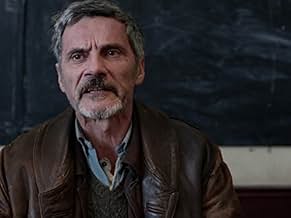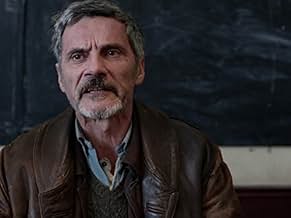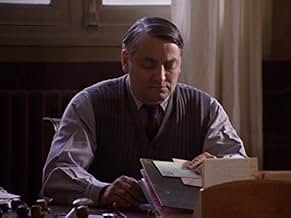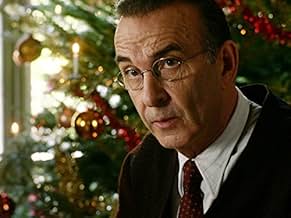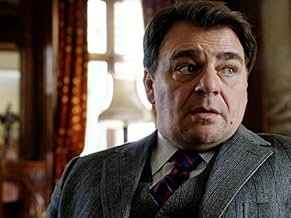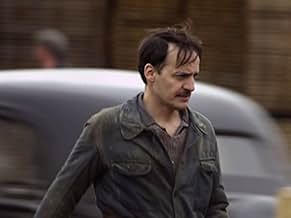Un village français - Überleben unter deutscher Besatzung
Originaltitel: Un village français
Der Film schildert die Erlebnisse verschiedener Bewohner eines fiktiven kleinen Dorfes innerhalb der Besatzungszone während des Zweiten Weltkriegs.Der Film schildert die Erlebnisse verschiedener Bewohner eines fiktiven kleinen Dorfes innerhalb der Besatzungszone während des Zweiten Weltkriegs.Der Film schildert die Erlebnisse verschiedener Bewohner eines fiktiven kleinen Dorfes innerhalb der Besatzungszone während des Zweiten Weltkriegs.
- Auszeichnungen
- 2 Gewinne & 10 Nominierungen insgesamt
Folgen durchsuchen
Empfohlene Bewertungen
This series is one of the best I've ever seen, the acting, the setting, and all of the historical details done so extremely well. It truly is a shame that this series does not have broader coverage here in the U.S., it would be an excellent choice for airing on HBO. The broad history behind this series is true, the experiences and brutal choices that have to be made by a population under occupation; and it makes one think "How would I cope under the same circumstances?" In watching each episode, I can't wait to see the next one. The cast of characters with different perspectives and story lines blends together flawlessly, and you end up caring about all of them. Truly well done.
This is a truly remarkable, riveting, and even addictive TV series, certainly one of the best I have ever seen, regardless of language. (I'm 64. I've seen a lot of TV series.) What makes it remarkable? The acting is uniformly first-rate, the direction very good, the script even better than first-rate. Each episode holds you from the get-go, and many end with cliff-hangers that make you want to start the next episode. As I said, it is downright addicting.
Are there any flaws? I don't know that I would call them flaws, but I can see that those interested in the history of the Occupation in France could have several issues with the series.
1) A previous reviewer wrote that it is an "Excellent TV show explaining the life of ordinary people in Nazi occupied France." Not really true. The main French characters are almost all members of the haute bourgeoisie: a leading doctor, a factory manager, the chief of police, etc. They do not deal with the issues that friends of mine remember from the Occupation: the shortage of everything, starting with food and fuel to heat homes. For ordinary French people, the Occupation was four years of waiting in line every day for bare necessities, punctuated by an occasional dramatic event. That wouldn't make for good TV drama, though, so this series has made the dramatic more "common" than it evidently was in the life of the average French person. The episodes almost all focus on dramatic events. It makes for riveting viewing, certainly, but it gives a skewed view of daily life during the Occupation.
2) Much of the focus is on sex and marital infidelity, rather than issues specific to the Occupation. (It reminds me a lot of Zola's Germninal in that sense.) This holds audiences, certainly, but there is nothing particularly related to the Occupation here. Almost all the wives turn out to be unfaithful to their husbands. I'm not sure how a feminist would react to that, or indeed many French women, faithful to their husbands or boyfriends, who lived through the era.
3) The depiction of the Communist Party leaders is uniformly negative. Again, the focus seems to be very bourgeois, very much Gaulliste. I noticed, for example, that when others, even Gaullistes like Bériot, refer to the Communists as Bolsheviks, that just gets translated as Communist. There is, of course, a big difference there. It is very true that many non-Communists feared the Communist Resistance and feared that their goal was to lead France into another class war/revolution, but that was not in fact the goal of all the FTP/Communist resistants.
All that said, I repeat that this is a riveting series. You will not regret watching it - except that you may well become addicted to it.
-----------------
I have now watched through the end of Season 6, which is as far as the American distribution has gone as of January 2017. (Season 7 is announced for mid-February.) All I have to add to what I wrote above is that this series does a remarkable job of making all the lead characters, no matter what their political position, very human and very three-dimensional. No one is all bad, and virtually no one is all good. That becomes very problematic for me in the case of the Militiamen and some of the Germans, the SS and the Gestapo. I don't like feeling sympathy or compassion for individuals who have committed monstrous crimes, as some of these characters do. Nevertheless, I will concede that even someone who can shoot two little children in cold blood - that is a VERY difficult scene to watch - might also have human qualities. I don't like conceding that, but I will.
The end of episode 12 of Season 6 turned my blood cold. It focused on some of the worst events of the Liberation, and made it anything but a joyous event. I know, having interviewed people who lived in a small town in France at that time, that what is described did indeed take place across France. Some of it is even toned down, like the shearing of the women accused of collaboration with the Germans. Still, it is a particularly somber note on which to end the penultimate season.
Are there any flaws? I don't know that I would call them flaws, but I can see that those interested in the history of the Occupation in France could have several issues with the series.
1) A previous reviewer wrote that it is an "Excellent TV show explaining the life of ordinary people in Nazi occupied France." Not really true. The main French characters are almost all members of the haute bourgeoisie: a leading doctor, a factory manager, the chief of police, etc. They do not deal with the issues that friends of mine remember from the Occupation: the shortage of everything, starting with food and fuel to heat homes. For ordinary French people, the Occupation was four years of waiting in line every day for bare necessities, punctuated by an occasional dramatic event. That wouldn't make for good TV drama, though, so this series has made the dramatic more "common" than it evidently was in the life of the average French person. The episodes almost all focus on dramatic events. It makes for riveting viewing, certainly, but it gives a skewed view of daily life during the Occupation.
2) Much of the focus is on sex and marital infidelity, rather than issues specific to the Occupation. (It reminds me a lot of Zola's Germninal in that sense.) This holds audiences, certainly, but there is nothing particularly related to the Occupation here. Almost all the wives turn out to be unfaithful to their husbands. I'm not sure how a feminist would react to that, or indeed many French women, faithful to their husbands or boyfriends, who lived through the era.
3) The depiction of the Communist Party leaders is uniformly negative. Again, the focus seems to be very bourgeois, very much Gaulliste. I noticed, for example, that when others, even Gaullistes like Bériot, refer to the Communists as Bolsheviks, that just gets translated as Communist. There is, of course, a big difference there. It is very true that many non-Communists feared the Communist Resistance and feared that their goal was to lead France into another class war/revolution, but that was not in fact the goal of all the FTP/Communist resistants.
All that said, I repeat that this is a riveting series. You will not regret watching it - except that you may well become addicted to it.
-----------------
I have now watched through the end of Season 6, which is as far as the American distribution has gone as of January 2017. (Season 7 is announced for mid-February.) All I have to add to what I wrote above is that this series does a remarkable job of making all the lead characters, no matter what their political position, very human and very three-dimensional. No one is all bad, and virtually no one is all good. That becomes very problematic for me in the case of the Militiamen and some of the Germans, the SS and the Gestapo. I don't like feeling sympathy or compassion for individuals who have committed monstrous crimes, as some of these characters do. Nevertheless, I will concede that even someone who can shoot two little children in cold blood - that is a VERY difficult scene to watch - might also have human qualities. I don't like conceding that, but I will.
The end of episode 12 of Season 6 turned my blood cold. It focused on some of the worst events of the Liberation, and made it anything but a joyous event. I know, having interviewed people who lived in a small town in France at that time, that what is described did indeed take place across France. Some of it is even toned down, like the shearing of the women accused of collaboration with the Germans. Still, it is a particularly somber note on which to end the penultimate season.
10cochet
This TV show describes the life of ordinary people in a small town of rural France during the German occupation in WWII. It is extremely well documented, cleverly written and very well played. The great plus of this series is that it meticulously analyzes the mechanisms which brought some people to collaborate with the Germans and others to resist, without judging, without falling into easy generalizations. The treatment of the small communist cell's actions is particularly spot on. I highly recommend this show to anyone interested in WWII, and anyone who wants to understand life during a war, and how good people can come to serve a fascist regime.
It always sounds really good to take a big, historical event and tell the story through the lens of a handful (or in this case a couple of dozen) characters. It is much harder to execute and more often than not the execution disappoints.
This is the exception. Un Village Francais is a masterful telling of the history of WWII France through the lens of a small village. Those who know their history know that France had a unique history during WWII as they neither remained fully free nor were they entirely occupied by the Nazis.
The show explores all of those dynamics, the naivete of the early German occupation (a reaction that makes sense in the context of a continent whose entire history is built around countries constantly coveting the land of others and seemingly constant wars), the problems that came with the full-on German occupation and the series even lasted long enough to explore the important and timeless themes raised in a post-war France.
The cast is top-notch, the drama is constant and the character arcs over the 7 seasons are almost unbelievable. As war would transform anybody, these characters by the end are almost unrecognizable from how they began.
It is one of the greatest television shows of all time.
This is the exception. Un Village Francais is a masterful telling of the history of WWII France through the lens of a small village. Those who know their history know that France had a unique history during WWII as they neither remained fully free nor were they entirely occupied by the Nazis.
The show explores all of those dynamics, the naivete of the early German occupation (a reaction that makes sense in the context of a continent whose entire history is built around countries constantly coveting the land of others and seemingly constant wars), the problems that came with the full-on German occupation and the series even lasted long enough to explore the important and timeless themes raised in a post-war France.
The cast is top-notch, the drama is constant and the character arcs over the 7 seasons are almost unbelievable. As war would transform anybody, these characters by the end are almost unrecognizable from how they began.
It is one of the greatest television shows of all time.
Fantastic series. It makes the war real, very concrete: not the battles, which we have seen before, but the struggles of ordinary people, trying to understand what's happening, and what that means for their convictions, their acts, who they are. They're slowly adjusting. We all ask ourselves what we would have done, but we forget about "time". Dealing with and understanding the occupation and atrocities took time. It's hard to understand now how people could be horrible, but it was hard then too. The war is hard, what happens to adults horrible. But, I have to say that the part about the Jewish children is unbearable, excruciating. This hits the limits of human understanding. As a mother, I couldn't go through it. Nobody could face this. We all know what happened, and can't accept it, but seeing this so real...
Wusstest du schon
- WissenswertesThe town depicted in the series, Villeneuve, is fictional.
- PatzerIn a first-season episode set during 1940, a German soldier is shown wearing the Close Combat Clasp, a decoration which first began to be awarded in November, 1942.
- VerbindungenReferenced in Séries express: Folge #2.30 (2009)
Top-Auswahl
Melde dich zum Bewerten an und greife auf die Watchlist für personalisierte Empfehlungen zu.
Details
- Erscheinungsdatum
- Herkunftsland
- Offizieller Standort
- Sprache
- Auch bekannt als
- A French Village
- Produktionsfirmen
- Weitere beteiligte Unternehmen bei IMDbPro anzeigen
- Laufzeit52 Minuten
- Farbe
- Seitenverhältnis
- 1.78 : 1
Zu dieser Seite beitragen
Bearbeitung vorschlagen oder fehlenden Inhalt hinzufügen

![Bande-annonce Saison 1 [OV] ansehen](https://m.media-amazon.com/images/M/MV5BYjJkN2E2M2QtNjgyZS00NTVjLThlYzMtNjBlM2QxZTMxODMwXkEyXkFqcGdeQXRodW1ibmFpbC1pbml0aWFsaXplcg@@._V1_QL75_UX500_CR0)
